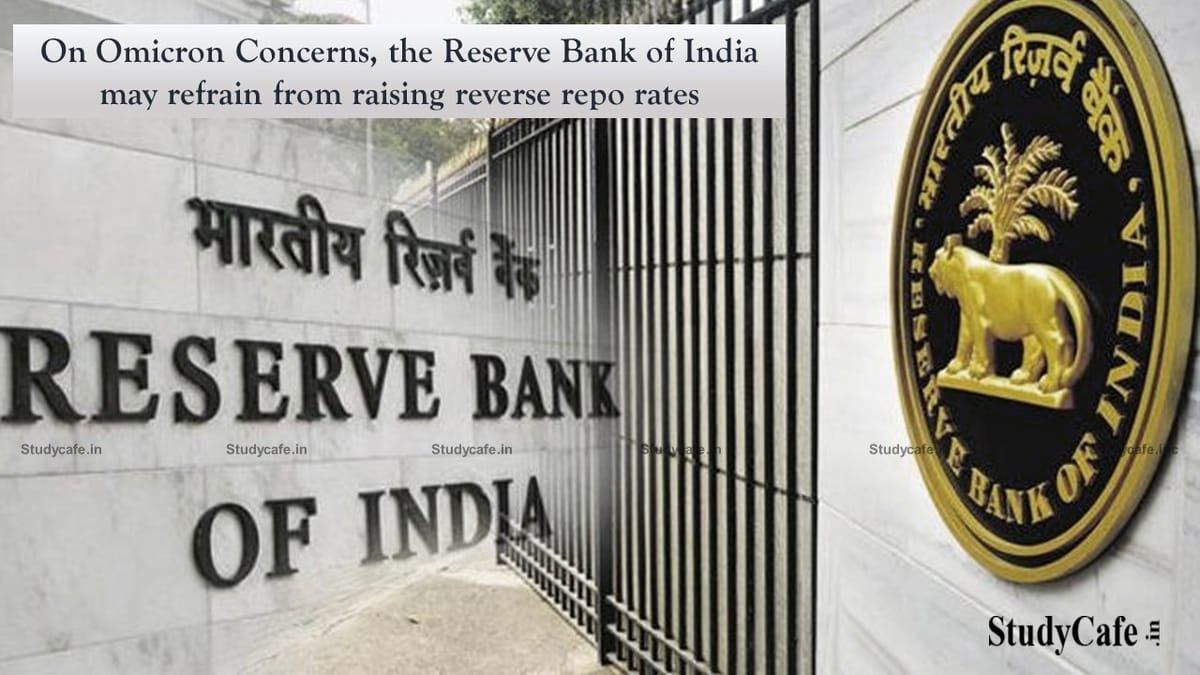Sushmita Goswami | Dec 7, 2021 |

Reserve Bank of India may refrain from raising reverse repo rates on Omicron Concerns
According to economists and market participants, the Reserve Bank of India will likely hold off on boosting its benchmark borrowing and lending rates on Wednesday as it adopts a cautious tone in the wake of the emergence of the Omicron coronavirus type.
In a poll conducted by Reuters on December 1-3, fifty analysts predicted that the RBI would keep its benchmark repo rate at 4.00 percent.
The reverse repo rate, which banks earn for keeping short-term cash at the RBI, is projected to stay at 3.35 percent, but several economists have priced in a tiny hike as the central bank strives to close the gap between lending and borrowing rates to levels seen before COVID-19.
In a letter, Soumya Kanti Ghosh, chief economic adviser at the State Bank of India, said, “We believe the RBI may deflate the euphoria over reverse repo hikes in monetary policy by emphasising the merits of utilising reverse repo change as a pure liquidity tool and not a rate instrument.”
The RBI slashed the reverse repo rate more aggressively than the repo rate, resulting in a 65-basis-point spread between the two rates, up from 25-basis-points before the epidemic.
Several other analysts believed that, given the unknowns surrounding the new Omicron variant’s impact on the economy, it was wiser to wait and see, despite inflationary pressures.
Analysts predict more steps to absorb the financial system’s liquidity surplus, as well as a watchful watch on any changes in growth and inflation projections.
India’s economy grew at the quickest rate among major economies in the third quarter of this year, at 8.4%, but economists warn that interruptions from the new virus type could delay the rebound.
Due to central and local government tax cuts on fuel, inflation has remained within the RBI’s target range of 2-6 percent, but the damage to perishable food products caused by unseasonably heavy rains and telecom price hikes are likely to push inflation up again.
“Inflation risks cannot be disregarded,” said Radhika Rao, a DBS Bank economist. “The decrease in September-October inflation is likely to be followed by an uptick back over 5.5-6 percent in 1Q22,” she added.
Consumer prices increased 4.48 percent year over year in October, up from 4.35 percent in September.
Ms Rao anticipates a 20-basis-point boost in the reverse repo rate in January, followed by a hike of the same magnitude in February.
“The pandemic situation is the important wild card,” she said, adding that any signals of a worsening outbreak would cause officials to err on the side of caution and return to the status quo.
In case of any Doubt regarding Membership you can mail us at [email protected]
Join Studycafe's WhatsApp Group or Telegram Channel for Latest Updates on Government Job, Sarkari Naukri, Private Jobs, Income Tax, GST, Companies Act, Judgements and CA, CS, ICWA, and MUCH MORE!"